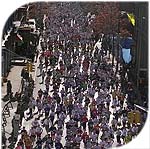|
|
| Formulas can be key to marathon success! | |
Ingredients for a successful marathon include a coordinated training program, proper nutrition and hydration, rest, and a strong support system. A clear goal is also a key to marathon success. Some head to the starting line with a goal of simply finishing. Most runners, however, have a target time. If a runner has done the right training, gets enough rest, feels good on race day, hydrates well, doesn't go out too fast, wears the right clothes, doesn't hit "the wall" too hard, and the day features decent weather, then the runner has the potential to reach his goal. In terms of preparation, one can certainly look to experienced runners and coaches for guidance in setting a time goal for a marathon based on performances at other distances. There are a number of formulas or charts that can be helpful, but these can vary widely. Joe Henderson, West Coast editor of Runner's World magazine and the author of scores of running books, likes a simple formula: Add 10 percent to the pace as the distance doubles. For example, a half-marathon in 2 hours computes to a potential 4-hour, 12-minute marathon (120 minutes x 2 + 12 minutes). "With most runners (including myself), the marathon is slower than predicted," Henderson said. "That's because the half is more a race, and the marathon more a survival test." Running statistician Ken Young said his pace slows by roughly 20 seconds per mile for each time the race distance is doubled. For example, a half-marathon at 9-minute-per-mile pace, or 1:58, could translate to a 4:04:44 marathon, or a 9:20 pace. "A runner with good endurance and little speed may slow down 15 seconds per mile," Young said. "And conversely, a runner with lots of speed and little endurance may slow down as much as 30 seconds a mile." Young emphasized that the runner must be training 60 miles per week for a period of at least two months in order for the formula to work. Some have even tried using track workouts to indicate marathon potential. Bart Yasso, race and event promotion director of Runner's World, has offered that the time in which one can run eight 800-meter runs, with only a 200-meter jog in between, is a good indicator of marathon time. For example, 800s in four minutes indicate a potential for a four-hour marathon. Bryan Hacker, who coaches a handful of Sacramento-area runners, employs a formula that doubles a half-marathon time then adds the time it would take to run 1.2 more miles at marathon pace. For example, a half-marathon ran at 9-minute pace, 1:58, could produce a marathon time of 3:56 plus 1.2 miles at the same pace, or 11 minutes for a 4:07 finish time. "Goals are helpful to think about before your event, but not during the race," Dahlkoetter said. "The pressure of performance can be overwhelming when your focus is primarily on the end result." Dahlkoetter recommends setting challenging, but realistic and specific goals. Both long-term and short-term goals, even in one race, can be helpful. A short-term goal might be to not run the first three miles too fast. Dahlkoetter said those who make their goals public in some way perform significantly better than those who keep their goals to themselves. "Telling a trusted friend or relative about your goals can be very effective," Dahlkoetter said. "You can then create a support system and have someone with whom to share your efforts and receive valuable feedback." Lastly, she advises focusing on aspects within one's control. "Direct your energies toward your running form, what you eat, the quality of your warmup, your race time, your mental focus, and doing your best," Dahlkoetter said. "Avoid focusing on things that are beyond your control such as the weather, the race course, or other competitors." But what about when the race is run and goals have not been met? Dahlkoetter said the challenge is to make the transition from a difficult loss to ultimate gain as quickly, smoothly and painlessly as possible. "Athletes who want to be successful learn to accept disappointments as well. Losing can be far more beneficial in the long run if you learn to properly re-examine your goals, assess your training program, and make the necessary adjustments," Dahlkoetter said. "It's not about one's value as a human being. It's about performing a specific skill, under particular conditions, on that particular day." Rae Clark of Auburn, Calif., a coach and finisher of 148 marathons, said post-race evaluation is critical if a goal is not met. "Where did you make mistakes? What caused the problems?" Clark asks the athletes he coaches. Common explanations include inadequate pre-race rest in the training program and losing focus during the tough middle miles. Good Luck! |


